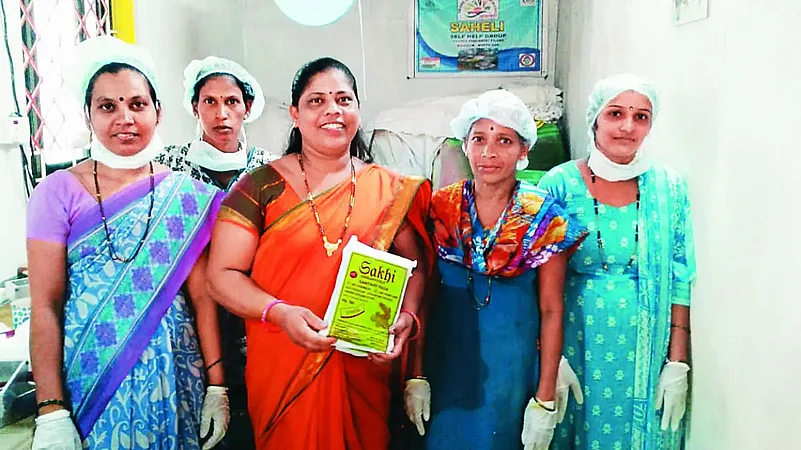Before the 2018 Akshay Kumar film Pad Man, there was a ‘pad woman’. The story of Goa’s Jayashree Parwar began in 2015. She was part of a low-key self-help group in Bicholim’s Pilgao area, in the heart of the iron-ore mining belt in North Goa, around 40 km from the state capital.
Members of her collective were trying to come up with a niche idea for a business, when an acquaintance informed them about a basic sanitary pad manufacturing machine that was available. “It was a machine similar to the one Akshay Kumar uses in Pad Man. It was very basic, but it helped us to start,” Parwar tells Outlook.
In the early years of the enterprise, Parwar got together with other self-help groups and started manufacturing 100-200 packets of biodegradable sanitary pads. Each packet of ‘Sakhi’ sanitary pads contained eight units. “By 2017, we had increased our capacity to 1,000 packets,” she said. Each packet is sold at a retail price of Rs 40.
Compared to mass-produced commercial alternatives, their pads are unique, because they are made of pinewood paper from Tamil Nadu, which decomposes in eight days when buried in soil.
In comparison, manufacturing of commercial sanitary pads requires the use of polymers for absorption, glue, and non-biodegradable plastic, which according to experts, may take 500-800 years to decompose.
From one machine, Parwar’s unit now has four, and has tied up with the NCR-based Ubantu Foundation, which assists her group to upgrade the quality and design of her product and develop promotion and marketing strategies.
Initially, Parwar says, it was difficult to convince women from her neighbourhood to assist in her initiative, due to the stigma associated with women’s hygiene. “They used to say we’re not going to do this. Think of some other product, they said,” Parwar says.
Then in 2018, Akshay Kumar’s Pad Man was released. It did the trick for Parwar. “Suddenly, I did not have to try hard to convince women to join us. The film created a lot of awareness about sanitary pads and helped shed the social stigma associated with it,” she said.
Once sold only in small pockets in Goa, Sakhi sanitary pads are now available for sale in various parts of India, including Rajasthan, Madhya Pradesh, Punjab and Telangana.
(This appeared in the print edition as "Their 'Sakhi'")
Liked the story? Do you or your friends have a similar story to share about 'ordinary' Indians making a difference to the community? Write to us. If your story is as compelling, we'll feature it online. Click here to submit.



























